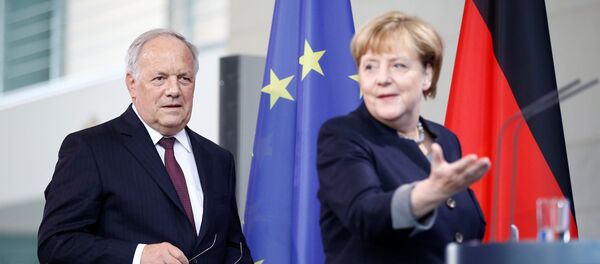After three years of discussions, negotiations and concerns about the impact on Switzerland, parliamentarians agreed on a deal that would satisfy the results of a February 2014 referendum, when 50.3 percent of people narrowly voted in favor of introducing controls against "mass immigration" from the EU.
The referendum sparked speculation Switzerland would have to completely reevaluate its relationship with the EU and may be forced out of the European single market, as such "mass immigration" controls were almost certainly likely to breach the bloc's four freedoms.
Merkel: “In the EU, we should carry on negotiations with Switzerland in the same way as we would have if there were no question on Britain”
— Open Europe (@OpenEurope) November 2, 2016
These concerns were heightened following the UK's decision to vote to leave the EU in June, amid fears any favorable deal given to Switzerland could be used as a precedent for Brexit talks.
This led to an extended stalemate in negotiations, with Swiss politicians looking at ways to delicately implement the results of the referendum without compromising the country's economic relationship with the EU, leading to calls from some to hold a second vote on the matter.
While Switzerland is not an EU country, it is part of the European passport-free Schengen zone and adheres to EU freedom of movement rules.
Plans Bear Little Resemblance to 'Mass Immigration' Controls
Despite the 2014 referendum calling for controls on "mass immigration," the new plans bear little resemblance to the initial text.
Under the Swiss proposals, instead of pursuing EU migration quotas, parliamentarians have agreed upon new unemployment rules aimed at limiting the impact of foreign workers on job opportunities for locals.
In professions, sectors or regions with above average unemployment, employers will be obliged to advertise vacant positions at job centers and invite selected Swiss job seekers to be interviewed, with a failure to do so resulting in a possible US$39,500 (40,000 franc) fine.
Switzerland may hold a second referendum. Justice Minister: voters have to decide "restrict free movement or single market, can't have both" pic.twitter.com/p3JJPVtcIL
— Alberto Nardelli (@AlbertoNardelli) October 28, 2016
These aspects of the proposals have been criticized for being toothless in addressing the issues surrounding local unemployment, with employers not required to justify the reasons behind rejecting a Swiss candidate.
Anti-immigration groups have also slammed the new proposals, arguing that they do not satisfy the referendum criteria on controlling immigration.
Switzerland as a non EU member still has to open its job market to EU countries as part of trade deals. #bordercontrols
— A n d y R (@AndrewReverand) June 6, 2016
The new deal is still subject to another parliamentary vote on Friday before it comes into action, however local media has reported that it is expected to pass through the house easily, as the anti-immigration Swiss People's Party (SVP) was the only political opponent.
However, even if the proposals are approved in parliament, the European Commission will still have to support the plans.



